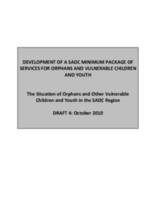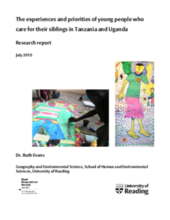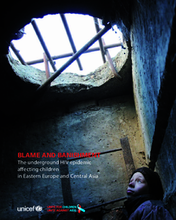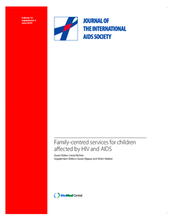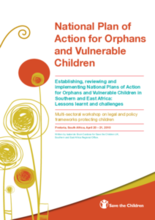Displaying 201 - 210 of 414
Shares recent findings on progress made and steps needed to achieve an AIDS-free generation through universal access to HIV prevention, treatment, and social protection
This report examines the impacts of HIV on the care choices of children, exploring how HIV affects whether or not children can remain within parental care, and on the alternative care options open to them.
This Situation Analysis Report is one of a series of three documents: (1) Report on the Situation of Orphans and Vulnerable and Children and Youth in the SADC Region; (2) Conceptual Framework for Psychosocial Support for Orphans and Vulnerable Children and Youth in the SADC Region; and (3) Minimum Package of Services for Orphans and Vulnerable Children and Youth in the SADC Region. The Situation Analysis Report has informed the development of the PSS Framework and the Minimum Package of Services.
In this study, data from 60 nationally representative household surveys (36 countries) were analyzed to establish if orphanhood and adult household illness consistently identified children with worse outcomes and also to identify other factors associated with adverse outcomes for children.
This report presents key findings from a small-scale pilot research project that explored the experiences and priorities of young people caring for their siblings in sibling-headed households affected by AIDS in Tanzania and Uganda.
An eye-opening analysis of the social, economic, political and family problems contributing to an overwhelming HIV epidemic that disproportionately affects young people, adolescents and children.
Explores the ways that young people express their agency and negotiate complex lifecourse transitions according to gender, age and inter- and intra-generational norms in sibling-headed households affected by AIDS in East Africa.
The special issue brings together the rationale for family-centred services for children affected by HIV and AIDS and some of the available evidence for the effectiveness of integrating treatment and care into the broader context of family-support schemes
This paper is based on The Latin American Report: The situation of children in Latin America without parental care or at risk of losing it. Contexts, causes and responses, which was prepared using reports from 13 countries in the region. The paper gives an overview of the state of one of the most fundamental rights - the right to parental care, a keystone for the right to live in a family and a community.
This report focuses on the experiences of Save the Children in monitoring, implementing and reviewing NPAs in Angola, Ethiopia, South Africa, Swaziland, Mozambique, Uganda and Zimbabwe. Each of the country offices commissioned the documentation of case studies to identify promising practices and challenges around effective implementation of NPAs.


